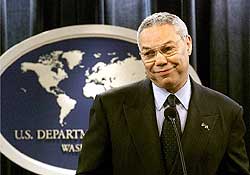 The flying visit of US Secretary of State Colin Powell to Nepal on Friday is the highest-level visit ever after Spiro Agnew stopped by for sight-seeing in 1970. This is as good a time as any to look at where Nepal fits in. After 11 September, every state that had been fighting an insurgency or separatist movement quickly hitched on to the US-led global "war on terror". It was convenient to look at a domestic uprising as part of a larger worldwide conspiracy so that we would be allied with the most powerful nation on earth. This may have given us someone to lean on, but such moral support is only a psychological consolation. It is not going to help us resolve a crisis that needs a domestic political solution.
The flying visit of US Secretary of State Colin Powell to Nepal on Friday is the highest-level visit ever after Spiro Agnew stopped by for sight-seeing in 1970. This is as good a time as any to look at where Nepal fits in. After 11 September, every state that had been fighting an insurgency or separatist movement quickly hitched on to the US-led global "war on terror". It was convenient to look at a domestic uprising as part of a larger worldwide conspiracy so that we would be allied with the most powerful nation on earth. This may have given us someone to lean on, but such moral support is only a psychological consolation. It is not going to help us resolve a crisis that needs a domestic political solution. It is important for us to learn lessons from Afghanistan, and do everything in our power to prevent Nepal from being turned into a battlefield where regional and world powers can play their proxy wars. This is a Nepali problem, and we should resolve it ourselves. The worst thing that can happen is for us to get sucked into regional rivalries that turn Nepal into another Afghanistan, or (god forbid) Cambodia. The Colin Powell visit to South Asia is just the latest in a flurry of diplomatic activities: Musharraf to Beijing, Blair to Islamabad, Zhu Rongji to Delhi.
Nepal's foreign policy is a legacy of our unique history. And there are some contradictions we have had to live with in exchange for never being colonised. One of them is the diplomatically embarrassing subject of Nepali citizens serving in foreign armies and fighting countries with which we have friendly relations.
If there is one word Nepali leaders hope never pops up at NAM and SAARC Summits (just as well Nepal is not in the Commonwealth and we don't have to attend CHOGM), it is the one beginning with "G". When Indian and Pakistani forces were eyeball-to-eyeball in the Poonch Sector during the SAARC Summit in Kathmandu, a lot of the eyeballs on the Indian side were actually Nepali eyeballs. In 1988, Nepali soldiers fought and died in Sri Lanka while serving in the Indian army against Tamil separatists.
Gurkha soldiers faced and fought against another friendly country, China, in Askai Chin and NEFA in 1961. Fortunately our neighbouring countries understand the historical reasons why this has been so. But others don't. When Gurkhas landed in the Falklands, Gabriel Garcia Marquez (among others) questioned the neo-colonial practice of our soldiers fighting to keep an imperial possession.
We like to repeat at every conceivable opportunity that Nepal has never been colonised. And it is true: we are the oldest established nation state in the region. But what is often overlooked, Mr Powell, is that Nepal has also been a western ally for nearly 200 years. In fact, ever since the 1814-16 Anglo-Nepal War and the
Sugauli Treaty, the Kingdom of Nepal has been the most consistently pro-western country in the region.
After Jung Bahadur became the first royal from the subcontinent to pay a state visit to Britain and France in 1850, we helped rescue the British in Lucknow during the Mutiny, Gurkha soliders were deployed in the disastrous British Afghan campaign in 1837. (What a historical twist that Gurkhas are now back in Afghanistan as part of the British commando force in Kabul.) Then through the two world wars of the last century, 100,000 Nepalis laid down their lives to defeat Germany and Japan-a shocking two percent of Nepal's total population at that time! No colonial possession sacrificed as much for Britain and the allies as independent Nepal did. And yet, visit the Imperial War Museum in London today, and aside from a lone khukuri exhibit inside a glass case, there is no other recognition or tribute to this bloody contribution of the Nepali nation. And what a supreme irony that the two countries we helped the west defeat-Japan and Germany-are today Nepal's two biggest donors. And Britain and the United States?
Nepal has always been a west-leaning member of the non-aligned. One of the things that used to irk the babus at South Block no end in the 1980s was that Nepal voted differently from India in 78 percent of all UN resolutions. Nepal was one of first countries in Asia (after Thailand) which had diplomatic relations with Israel.
We are not passing judgement on this support to the colonialists, the west, the allies. It is just a historical fact. So why are we raking all this up? Just to remind Colin Powell that Nepal always stood by the west during its hours of need. Maybe the west should stand by the Nepali people when our democracy is in crisis. Not by beefing up our military or cosying up to authoritarian evolution, but by a Marshall Plan-type economic aid for infrastructure, trade and tourism. In return, our own leaders must attend to the rot by improving governance and by devolving more decision-making power to the grassroots.


